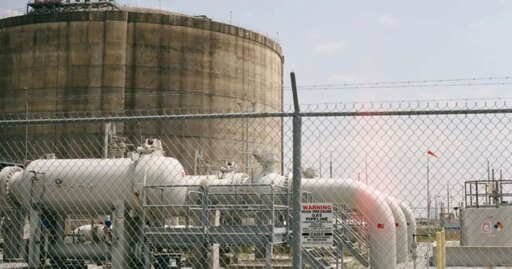In Louisiana, natural gas—a planet-heating fossil fuel—is now, by law, considered “green energy” that can compete with solar and wind projects for clean energy funding. The law, signed by Republican Governor Jeff Landry last month, comes on the heels of similar bills passed in Ohio, Tennessee, and Indiana. What the bills have in common—besides an “updated definition” of a fossil fuel as a clean energy source—is language seemingly plucked straight from a right-wing think tank backed by oil and gas billionaire and activist Charles Koch.
Louisiana’s law was based on a template created by the American Legislative Exchange Council (ALEC), a conservative organization that brings legislators and corporate lobbyists together to draft bills “dedicated to the principles of limited government, free markets and federalism.” The law maintains that Louisiana, in order to minimize its reliance on “foreign adversary nations” for energy, must ensure that natural gas and nuclear power are eligible for “all state programs that fund ‘green energy’ or ‘clean energy’ initiatives.”
Louisiana state Rep. Jacob Landry first introduced a near-identical bill to the model posted on ALEC’s website and to the other bills that have passed in Ohio, Tennessee, and Indiana. (The Washington Post reported in 2023 that ALEC was involved in Ohio’s bill; ALEC denies involvement.) Landry, who represents a small district in the southern part of the state, is the recipient of significant fossil fuel-industry funding—and he co-owns two oil and gas consulting firms himself. During his campaign for the state Legislature, Landry received donations from at least 15 fossil-fuel-affiliated companies and PACs, including ExxonMobil (which has also funded ALEC) and Phillips 66. Those donations alone totaled over $20,000.



I would say it is mostly an awareness thing. Electric vehicles are thought of as the best for the environment and people aren’t really aware or don’t care that they can cut their Co2 related output by about ~50% with their existing ICE vehicle. People just don’t know that they can choose to use a different fuel and have environmental benefits that way because no one from the car makers to the gas pumps really advertised or educated them on it.
A few car makers did have branded Flex fuel cars but really they were only branded that way to take advantage of a poorly crafted government tax credit. Many existing cars that can run e85 have no indication that they can run it and run cleaner with it which can lead to less maintenance issues and make the mechanic’s job easier.
With that said ethanol is in some respects a worse fuel, since it attracts water which doesn’t play nice with burning and as you mentioned is not as dense, but it is a much better fuel from an environmental perspective. Neither of those issues are deal breaker’s since you can just fill up a little more often or add a fuel additive occasionally to dehydrate the fuel.
I also think maybe the politics of farm subsidies for corn and ethanol are also somewhat of an issue, since massive government subsidies for corn growing and ethanol production are unfairly distorting the market quite a bit. But then again that’s par for the course compared with oil.
I have heard that most of the producers of ethanol have been bought out and taken over by oil companies, so I wouldn’t expect them to make a serious effort to promote it’s benefits or compete well since the oil companies wouldn’t like that.